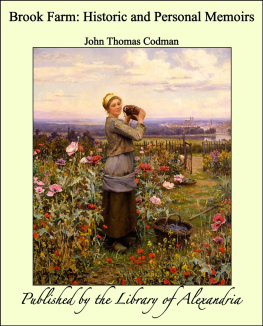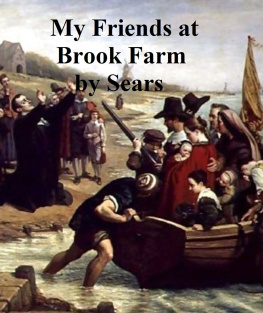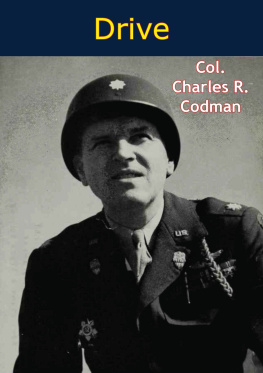John Thomas Codman - Brook Farm: Historic and Personal Memoirs
Here you can read online John Thomas Codman - Brook Farm: Historic and Personal Memoirs full text of the book (entire story) in english for free. Download pdf and epub, get meaning, cover and reviews about this ebook. year: 2009, publisher: Library of Alexandria, genre: Science. Description of the work, (preface) as well as reviews are available. Best literature library LitArk.com created for fans of good reading and offers a wide selection of genres:
Romance novel
Science fiction
Adventure
Detective
Science
History
Home and family
Prose
Art
Politics
Computer
Non-fiction
Religion
Business
Children
Humor
Choose a favorite category and find really read worthwhile books. Enjoy immersion in the world of imagination, feel the emotions of the characters or learn something new for yourself, make an fascinating discovery.
- Book:Brook Farm: Historic and Personal Memoirs
- Author:
- Publisher:Library of Alexandria
- Genre:
- Year:2009
- Rating:5 / 5
- Favourites:Add to favourites
- Your mark:
- 100
- 1
- 2
- 3
- 4
- 5
Brook Farm: Historic and Personal Memoirs: summary, description and annotation
We offer to read an annotation, description, summary or preface (depends on what the author of the book "Brook Farm: Historic and Personal Memoirs" wrote himself). If you haven't found the necessary information about the book — write in the comments, we will try to find it.
Brook Farm: Historic and Personal Memoirs — read online for free the complete book (whole text) full work
Below is the text of the book, divided by pages. System saving the place of the last page read, allows you to conveniently read the book "Brook Farm: Historic and Personal Memoirs" online for free, without having to search again every time where you left off. Put a bookmark, and you can go to the page where you finished reading at any time.
Font size:
Interval:
Bookmark:
of the Transcendental ClubThe first Persons at the
CommunityConstitution and Laws; Articles of AgreementDescription of
Mr. Ripley, Mr. Pratt, Mr. Dwight, Mrs. Ripley, Mr. Dana, Mr. Bradford,
Hawthorne and Others.
ActionProgress of SocietyTheories by Fourier, etc.Closing of the
Transcendental PeriodReorganization, and the Industrial Period.
PlaceAtticaPersonal Occupations, etc.The Wild Flowers.
CheeversWilliam H. Charming, and Albert Brisbane,S. Margaret
FullerRalph W. EmersonTheodore Parker and Mr. Ripley's Joke.
WorkshopMy first SpringDeath and FuneralThe Amusement Group,
Dances, Walks and first Summer.
Characteristics and EffectThe Industrial PhalanxThe PhalansteryA
Financial ReportThe Grahamites, and their TableJohn Allen and
BoyThe Visitation of Small-pox.
DepartmentPrince AlbertJumping the BrookRetrenchmentThe
DovesThe GardenerThe Position of Woman in AssociationThe Right to
VoteThe WeddingLizzie CursonOur Young Folks.
LetterMr. Brisbane's, and Mr. Ripley's LettersMr. Pratt's
DepartureThe Great PartyCyclops.
EyryConsciousness of SelfThe Great Snow StormC. P. Cranch's
Imitations.
New York PressDefinition of the Associationists Position toward
FourierForebodings at the FarmPersonal Reveries.
ChristiansThe Solidarity of the RaceMr. Ripley's Harbinger
Article.
Dana; Mr. Dwight, and various PersonsWilliam H. CharmingA.
BrisbaneC. FourierLetters of Approval.
EqualityReligious Views.
Font size:
Interval:
Bookmark:
Similar books «Brook Farm: Historic and Personal Memoirs»
Look at similar books to Brook Farm: Historic and Personal Memoirs. We have selected literature similar in name and meaning in the hope of providing readers with more options to find new, interesting, not yet read works.
Discussion, reviews of the book Brook Farm: Historic and Personal Memoirs and just readers' own opinions. Leave your comments, write what you think about the work, its meaning or the main characters. Specify what exactly you liked and what you didn't like, and why you think so.







